GEEKOM A7 mini-PC Review : Premium Phoenix in a Compact 4x4 Package
by Ganesh T S on May 31, 2024 8:00 AM ESTSystem Performance: Application-Specific Workloads
Standardized benchmarks such as UL's PCMark 10 and BAPCo's SYSmark take a holistic view of the system and process a wide range of workloads to arrive at a single score. Some systems are required to excel at specific tasks - so it is often helpful to see how a computer performs in specific scenarios such as rendering, transcoding, JavaScript execution (web browsing), etc. This section presents focused benchmark numbers for specific application scenarios.
3D Rendering - CINEBENCH R23
We use CINEBENCH R23 for 3D rendering evaluation. R23 provides two benchmark modes - single threaded and multi-threaded. Evaluation of different PC configurations in both supported modes provided us the following results.
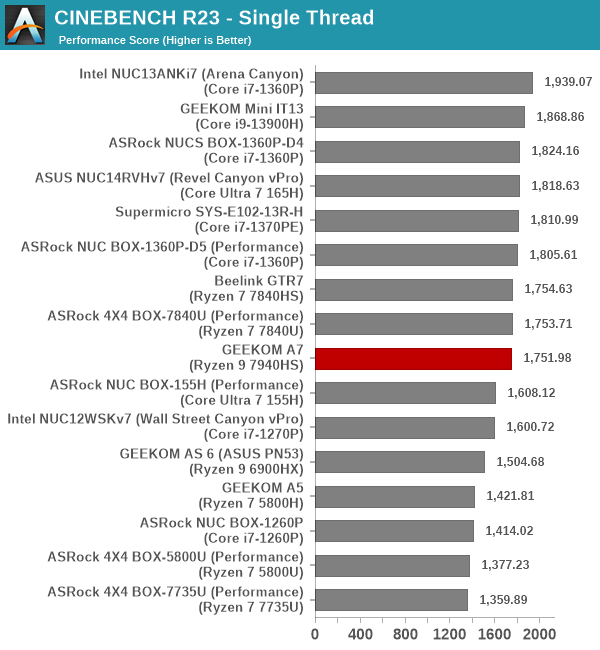
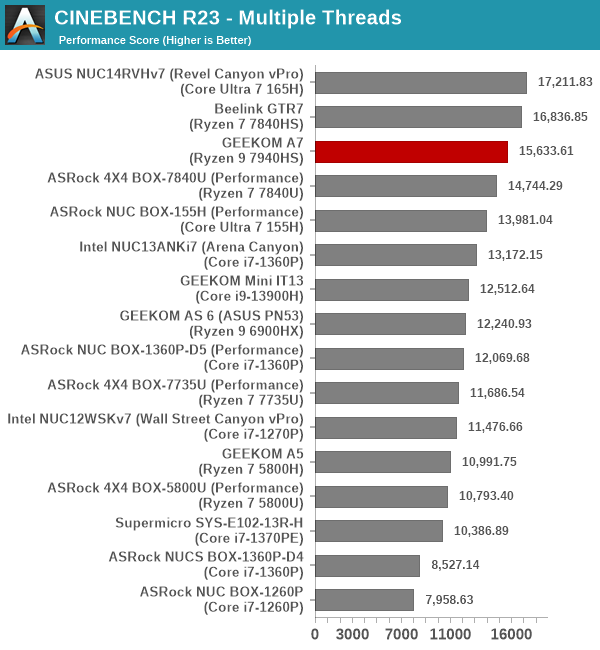
Intel's latest processors continue to have the edge in single-threaded performance, but the multi-threaded case presents a different story reliant on the power budget and the number of available threads. The relatively low power budget acts to the detriment of the A7 here and we see it in the middle of the pack for the ST case. For the MT case, it does find itself in the top 3 and emerges on top among the non-65W systems.
Transcoding: Handbrake 1.5.1
Handbrake is one of the most user-friendly open source transcoding front-ends in the market. It allows users to opt for either software-based higher quality processing or hardware-based fast processing in their transcoding jobs. Our new test suite uses the 'Tears of Steel' 4K AVC video as input and transcodes it with a quality setting of 19 to create a 720p AVC stream and a 1080p HEVC stream.
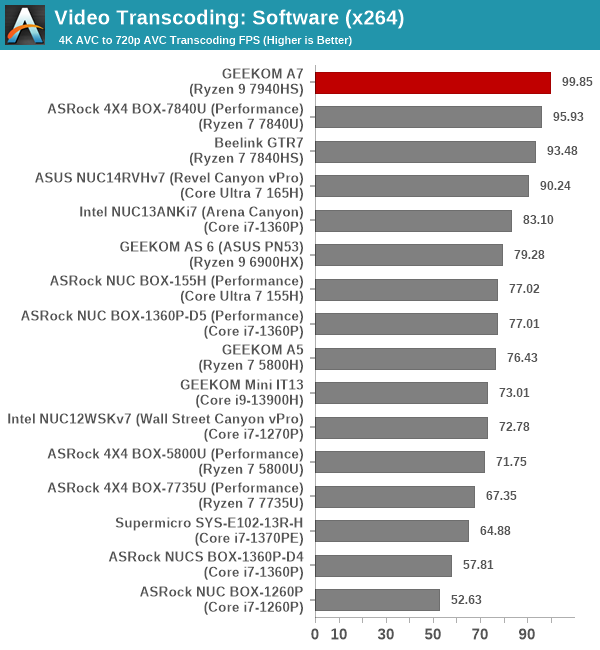
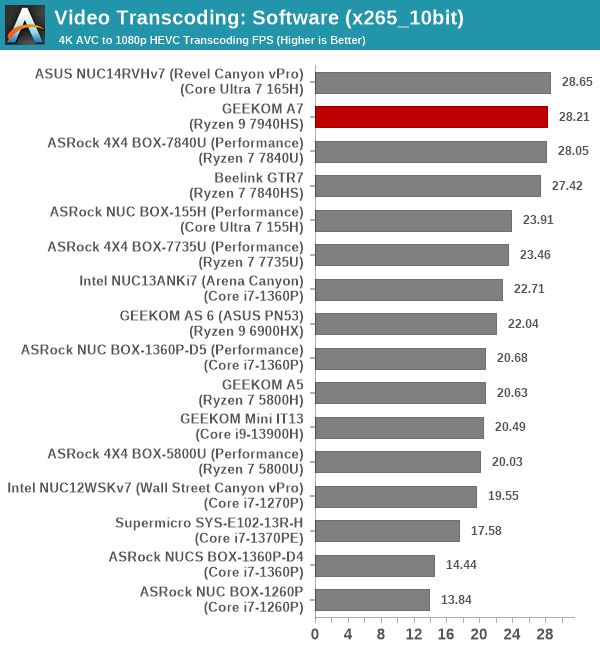
Software transcoding performance depends on the number of available threads and the performance on them, as well as the available power budget. Surprisingly, we see the A7 on top despite the 35W limitation in the x264 case, though the lack of budget makes it narrowly miss the top in the x265 case to the 65W Meteor Lake-H system. Higher boost clocks probably plays a part in the lead over the GTR7's Ryzen 7 7840HS.
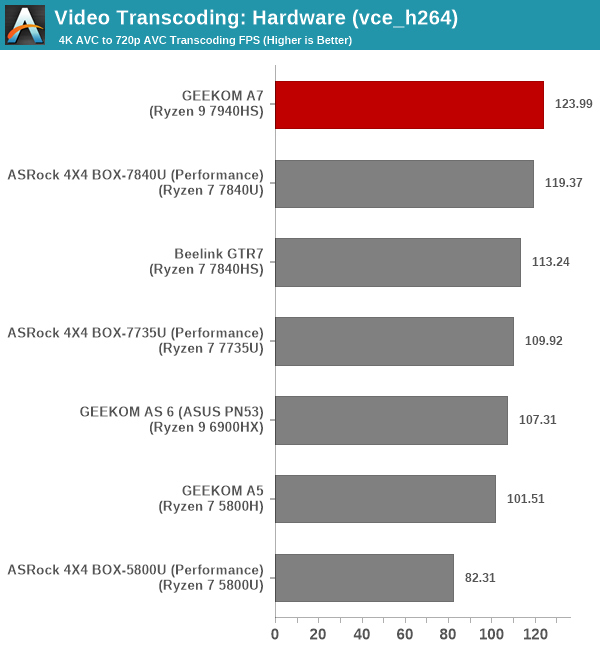
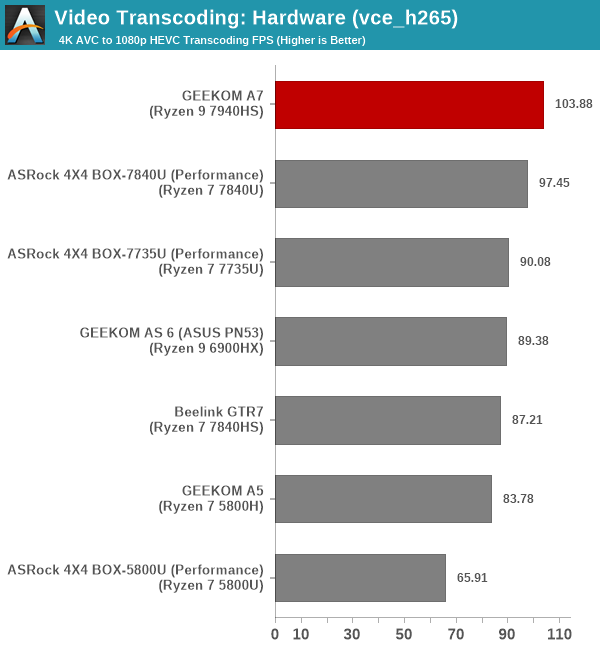
Hardware transcoding performance using VCE depends on the iGPU clock rates. It also depends on the available power budget for long-term tasks, particularly for the iGPU. The A7 has a slight edge in clock rates, and that shows up as a significant delta in the FPS numbers for VCE processing. Other than that, it is easy to note that the numbers improve with newer iGPU generations.
Archiving: 7-Zip 21.7
The 7-Zip benchmark is carried over from our previous test suite with an update to the latest version of the open source compression / decompression software.
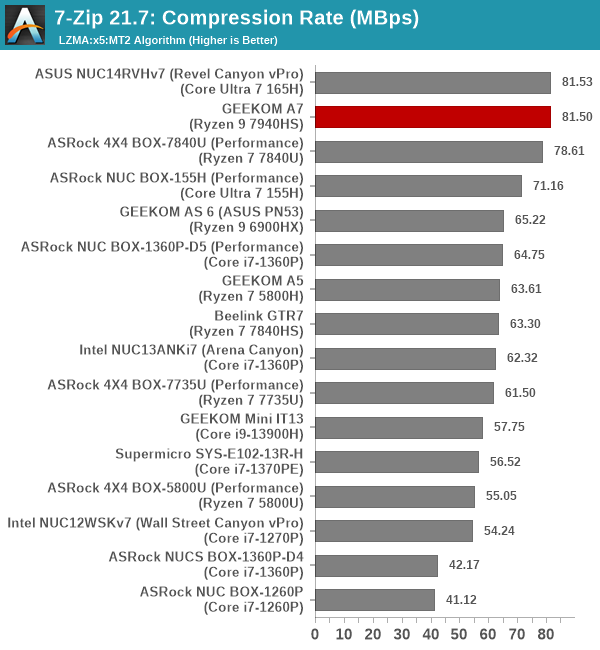
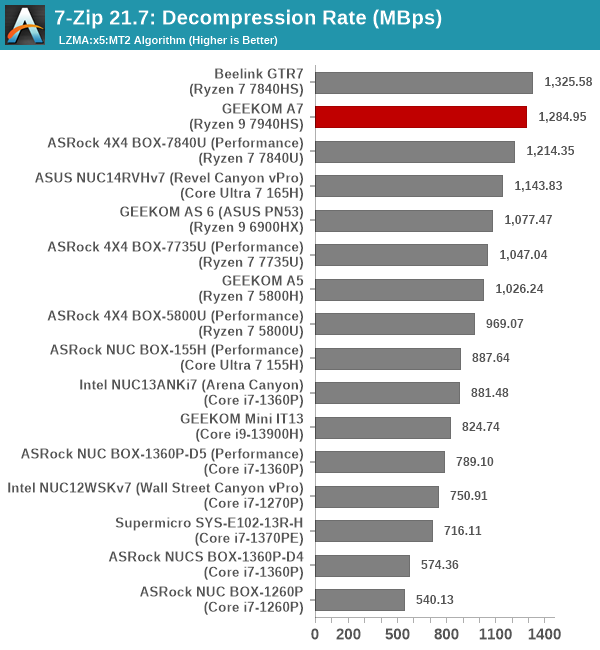
The A7 clocks in second in both benchmarks, but losing out to 65W configurations is no cause for concern given the overall energy efficiency and form-factor of the system.
Web Browsing: JetStream, Speedometer, and Principled Technologies WebXPRT4
Web browser-based workloads have emerged as a major component of the typical home and business PC usage scenarios. For headless systems, many applications based on JavaScript are becoming relevant too. In order to evaluate systems for their JavaScript execution efficiency, we are carrying over the browser-focused benchmarks from the WebKit developers used in our notebook reviews. Hosted at BrowserBench, JetStream 2.0 benchmarks JavaScript and WebAssembly performance, while Speedometer measures web application responsiveness.
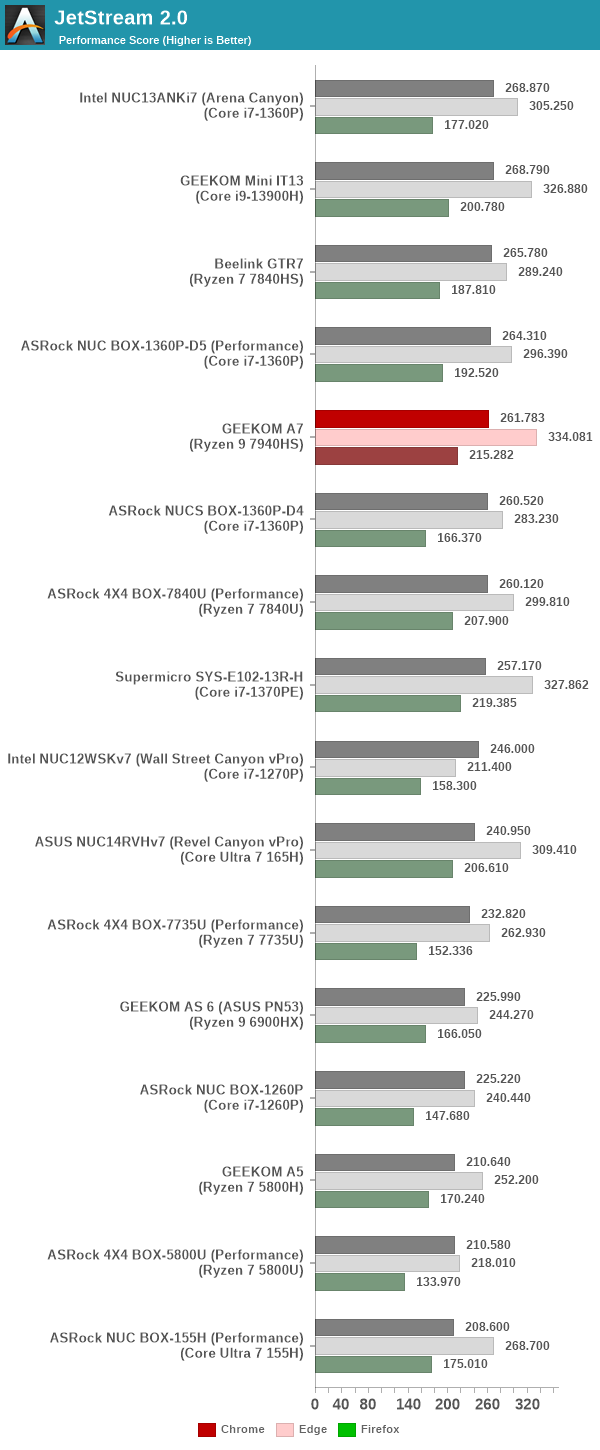
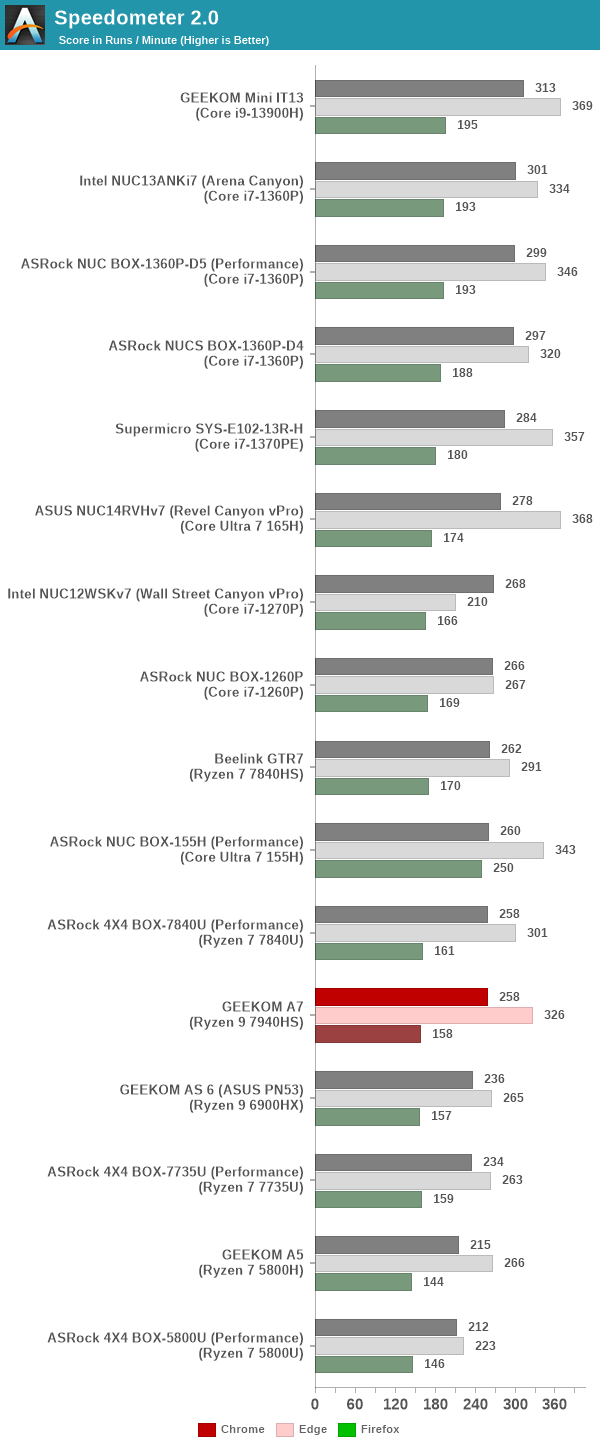
From a real-life workload perspective, we also process WebXPRT4 from Principled Technologies. WebXPRT4 benchmarks the performance of some popular JavaScript libraries that are widely used in websites.
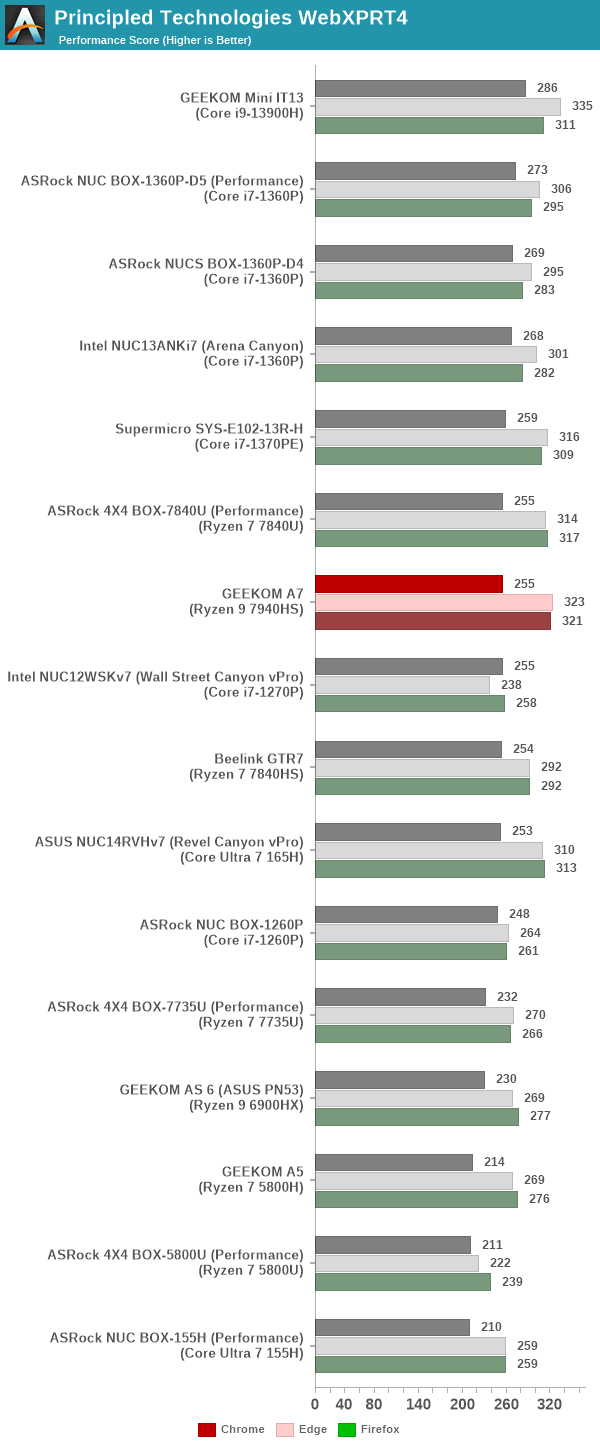
The workload characteristics are such that the short bursts of high clock speeds turn out to be good - particularly for real-world web browser workloads like WebXPRT4. Single-threaded performance is also very important. Intel-based systems used to have a free reign in this benchmark for a long time. However, we see the A7 configuration now deliver better results than Meteor Lake-H at 65W in the Edge case for WebXPRT 4 (though the GEEKOM Mini IT13 continues to rule at the top with its combination of high boost speeds and single-threaded performance).
Application Startup: GIMP 2.10.30
A new addition to our systems test suite is AppTimer - a benchmark that loads up a program and determines how long it takes for it to accept user inputs. We use GIMP 2.10.30 with a 50MB multi-layered xcf file as input. What we test here is the first run as well as the cached run - normally on the first time a user loads the GIMP package from a fresh install, the system has to configure a few dozen files that remain optimized on subsequent opening. For our test we delete those configured optimized files in order to force a fresh load every second time the software is run.
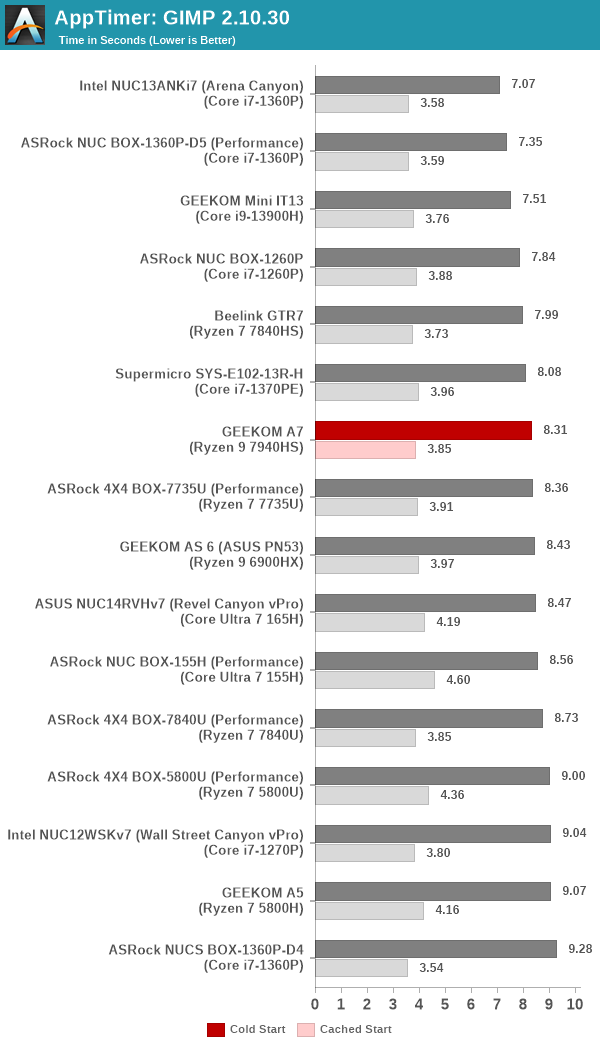
As it turns out, GIMP does optimizations for every CPU thread in the system, which requires that higher thread-count processors take a lot longer to run. So the test runs quick on systems with fewer threads, however fast cores are also needed. The A7 finds itself in the middle of the pack.
Cryptography Benchmarks
Cryptography has become an indispensable part of our interaction with computing systems. Almost all modern systems have some sort of hardware-acceleration for making cryptographic operations faster and more power efficient. In the case of IoT servers, many applications - including web server functionality and VPN - need cryptography acceleration.
BitLocker is a Windows features that encrypts entire disk volumes. While drives that offer encryption capabilities are dealt with using that feature, most legacy systems and external drives have to use the host system implementation. Windows has no direct benchmark for BitLocker. However, we cooked up a BitLocker operation sequence to determine the adeptness of the system at handling BitLocker operations. We start off with a 4.5GB RAM drive in which a 4GB VHD (virtual hard disk) is created. This VHD is then mounted, and BitLocker is enabled on the volume. Once the BitLocker encryption process gets done, BitLocker is disabled. This triggers a decryption process. The times taken to complete the encryption and decryption are recorded. This process is repeated 25 times, and the average of the last 20 iterations is graphed below.
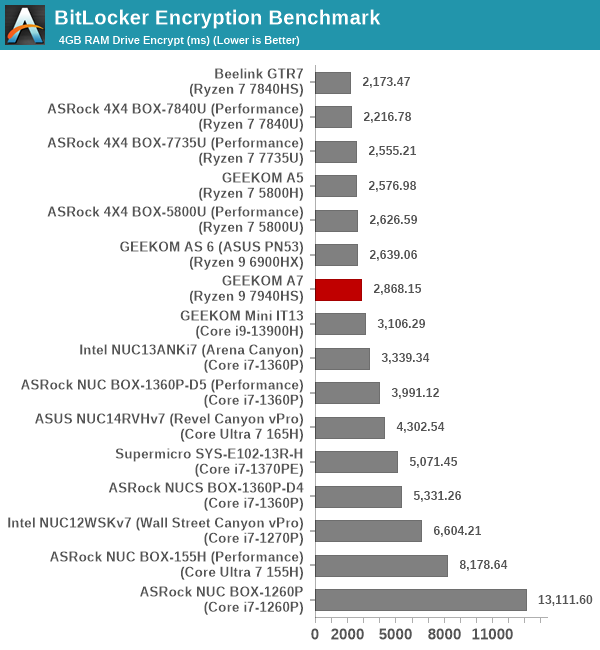
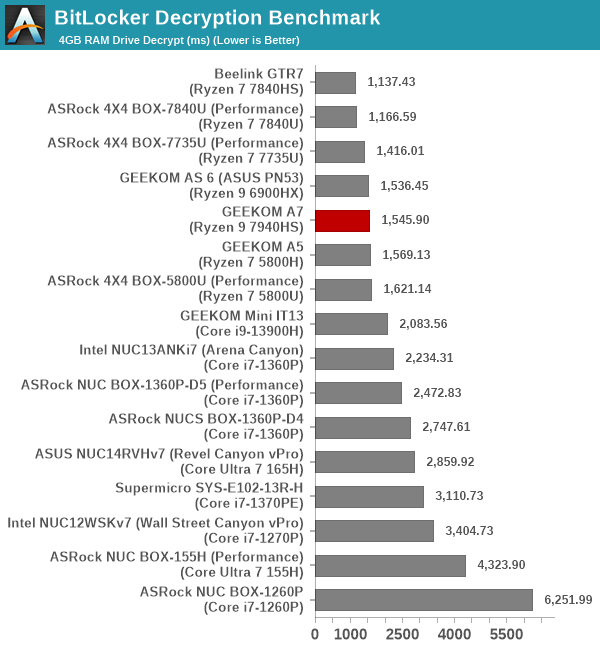
Hardware acceleration is available for the operations in all of the systems. The time taken for processing is directly dependent on the available power budget within a given generation. As a result, the A7 finds itself in the middle of the top half of the pack.










18 Comments
View All Comments
TheinsanegamerN - Friday, May 31, 2024 - link
I feel like I'd be much more excited about these when we get a strix halo version.The Hardcard - Friday, May 31, 2024 - link
The problem is by the time of the review, there will be so many details leaked about Zen 6 products that your excitement for Strix Halo will be crushed.kn00tcn - Friday, May 31, 2024 - link
did you forget what strix halo will be? the single biggest leap in gpu size in any apu ever, it's extremely unlikely that the gen right after that would somehow leap again unless integrated gddr is usedt.s - Saturday, June 1, 2024 - link
bingo!meacupla - Friday, May 31, 2024 - link
The one shortcoming of all these startup mini-PC brands is longer term BIOS support.My 2020 AMD Renoir Dell laptop still gets occasional BIOS updates, but the same cannot be said of the trigkey, kamrui, or bosgame mini-PCs that I have kicking around.
Desierz - Friday, May 31, 2024 - link
Have you considered if they really need BIOS updates?PeachNCream - Friday, May 31, 2024 - link
They generally work with release BIOS versions but its quite common to see updates later resolve problems or enhance relaibility so after sales support can a significant consideration.kn00tcn - Friday, May 31, 2024 - link
have you considered agesa updates have already contained important memory, usb, and security updates multiple times in the past?meacupla - Friday, May 31, 2024 - link
They do. One of them is missing a critical fix for Zen bleed. So it's missing Agesa 1.2.0.bkn00tcn - Friday, May 31, 2024 - link
those sound like random aliexpress 'brands', while geekom or minisforum have been established worldwide names by contrast (not that i've checked their updates, even majors like asrock are disappointing for agesa updates on deskmini/deskmeet)